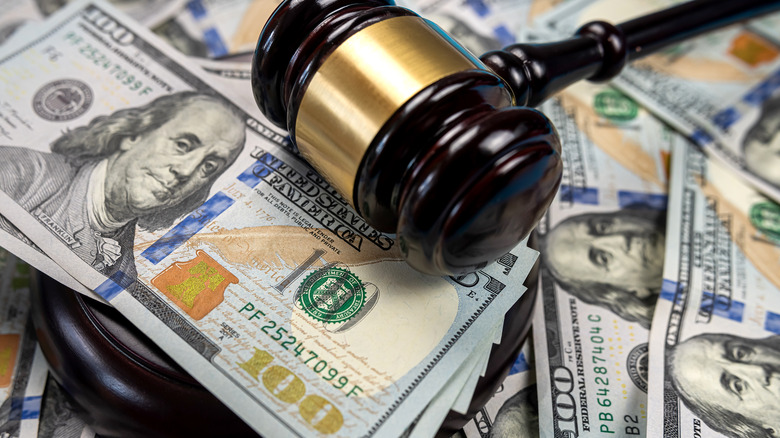Why Fast Food Chains Are Being Sued For False Advertising
Where's the beef? It's been a known fact in the fast food industry for years that menu items often look better in the ads than they do at the drive-thru window. But lately, it's getting fast food chains in legal hot water, with multiple restaurants slapped with false advertisement lawsuits. In fact, according to QSR, there were more than 200 class action lawsuits between 2020 and 2022. In comparison, there were only around 50 in 2011. So it begs the question, why exactly are companies getting in more trouble as time goes on?
There are several reasons for the rise of false advertisement lawsuits. For one, we live in an increasingly digital age where consumers are not only aware of ad tactics but also have the ability to critique and discuss them online. With access to the World Wide Web, it's increasingly easy to double-check and fact-check ingredients on menu items. Such was the case of one consumer who sued Subway after discovering evidence that its tuna subs may not contain 100% tuna.
Beyond just online discourse, there also seem to be certain law firms waging war with the fast food industry in hopes of scoring a win. For instance, one firm filed a lawsuit against Burger King and pending lawsuits against McDonald's and Wendy's over their burger sizes. More recently, it also chose to represent one customer accusing Taco Bell's items of not being up to snuff when compared to its advertisement (via Reuters). But why?
Low probability of success
Perhaps, it's the low probability of success that's led to the recent boom of false advertisement suits. In an interview with Insider, a legal adviser explained that some law firms are opting to hedge their bets, choosing to represent a variety of clients in hopes of scoring a high-profile victory. The hope here is that a legal win from one case will pay for the legal fees for the rest. However, scoring a win on a false advertisement lawsuit can be challenging at best.
For instance, the Burger King suit ended up being stayed indefinitely. When it comes to false advertisements, you must prove that the advertisement isn't puffery or an exaggerated boast. A reasonable person would need to be fooled or misled by the ad. For instance, calling your burger the "world's best" or "most delicious" wouldn't be a suable offense because those phrases are hyperbolic in nature. You have to prove that the restaurant or company intentionally misled its customers.
However, there are certain federal guidelines (such as FDA regulations) and state laws (such as California's) which require a food item to list if it is a genetically modified organism. While the FTC says that photos of food must not mislead its customers, it hasn't enforced any allegations that certain ads can be misleading, despite companies often artificially enhancing food used in commercials. All that being said, it remains to be seen how many of these lawsuits will shake out.

